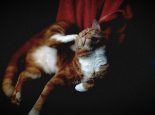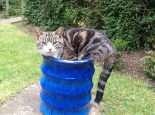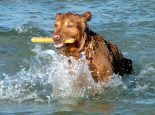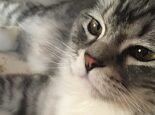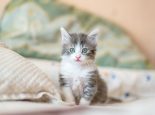Vet’s diary: inside the mind of a cat
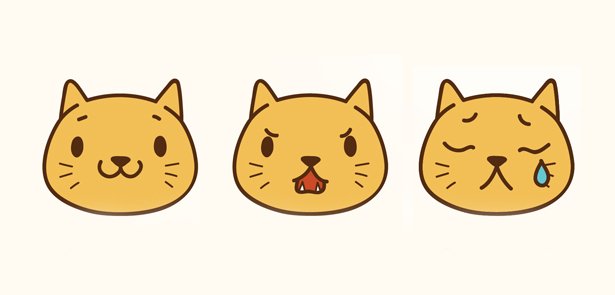
This issue, Peterborough vet Laura Frost asks: ‘What goes on inside a cat’s head?’
If I cast my mind back to vet school lectures, one comment has always stuck in my mind, ‘cats are not small dogs’. Aside from the fact my beautiful Maine Coon boy (Thor) weighs in at 8kg and is bigger than some dogs, this statement has helped me out on several occasions. Firstly, cats and dogs have some distinctive medical differences. For example an overactive thyroid gland is very rare in the dog and prompts a search for a tumour, however in cats it is a very benign disease with many highly successful treatment options.
Some medications need to be avoided in cats because they lack certain enzymes in their liver to break them down. Cats also have a clavicle (collar bone) but dogs do not. Trivia aside, I think the most interesting thing about a cat is its attitude. Most dog owners out there will agree that they know what is going through their dog’s mind most of the time. Training a dog is a very rewarding experience and with a little perseverance most dogs will listen to the owner and obey a wide range of commands, helping to keep them safe on walks, or just for fun.
What would be the answer if I asked a hundred cat owners? I think the top answer would be, ‘I don’t know, but he looks like he is plotting to take over the world.’ The real answer however is more complex. A few months ago I sought the help of the cat behaviour specialist when my own cat started to exhibit some unwanted behaviour. Being honest with you, it was a very stressful situation. My gentle giant started to bite me and my husband. It was never particularly hard and didn’t ever seem in anger. He would frequently jump up onto the bed and bite gently in slow motion then sit back and stare at us, then walk around for a few seconds as if choosing his next target and repeat. He never hissed or growled and wasn’t showing any other signs of stress or anxiety. At first it was restricted to night time, but it progressed so he would chase us and ‘nip’ our ankles downstairs. At other times he was very cuddly and happy.
After weeks of trying to sort out the problem ourselves we decided to consult a behaviourist who came to our house and spent a few hours with us looking at his environment and analysing how he acted. What she found was both reassuring and interesting. Cats are solitary hunters. They also do not readily wait for the resources which they need; they have to have their needs met immediately. This means that they must be able to feed, drink, sleep, hide, play, receive affection, toilet and hunt as the motivation takes them. Any lack of availability of these essentials causes them anxiety and stress.
As a young cat, Thor likes to play. The behaviours seen may be invitations to his owners to join in the games, to make them more stimulating and interesting. The games usually involve toys, but sometimes Thor is mistaking his owners’ arms and legs for play items, as they are the parts of our bodies which move the most. It is the movement which triggers the play behaviours towards the toy or us. He is not actually trying to attack in the sense of wanting to cause injury to you as evidenced by the lack of force with which he is biting.
The conclusion was that most areas of Thor’s life were taken care of, but as an indoor cat he is unable to hunt. What we were seeing was part of his frustrated hunting ritual rather than aggression in the true sense of the word. In order to help him to fulfil his urges we have designed games that involve chasing a toy followed by substituting it for a food parcel at the end. This was made simple by wrapping some treats in a square of kitchen towel and tying to the end of a piece of string with a feather for good measure. Once he has ‘caught’ his prey we then open one end of the parcel so he can smell the treat and he can attack it to his heart’s content and eat the spoils of his hunt. Our limbs are now much safer and our boy is happier. Simples!
 Laura Frost MRCVS MA VetMB is a vet at local veterinary practice Pengelly and Mizen.
Laura Frost MRCVS MA VetMB is a vet at local veterinary practice Pengelly and Mizen.
Pengelly and Mizen Veterinary Surgeons 89-93 Park Road, Peterborough PE1 2TR T: 01733 554953 Emergencies only: 01733 896000 www.pengellyandmizen.co.uk
Image: www.freepik.com/free-vector/flat-pack-of-cute-cat-emojis_1001312.htm








